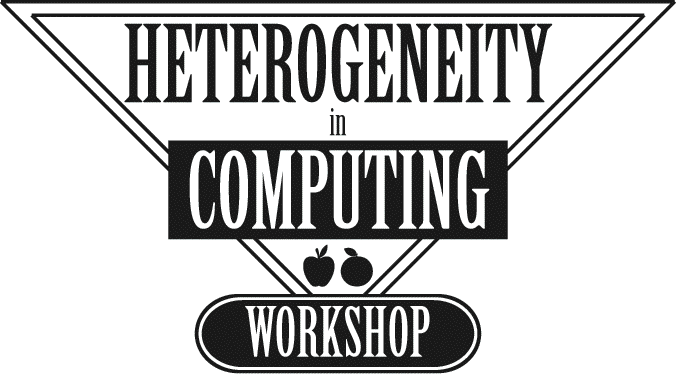HCW 2010 Call for Papers
The Nineteenth International 
To be held in
Atlanta, USA, April 19, 2010,
in conjunction with IPDPS 2010
Sponsored by
the IEEE Computer Society,
through the Technical Committee on
Parallel Processing (TCPP),
and by the U.S. Office of Naval Research (ONR).
Today, most computing systems have elements of heterogeneity. Heterogeneity springs from the richness of environments where diversity and resource abundance prevail. Recognizing, capturing, and efficiently exploiting this diversity in an integrated and coherent manner are key goals of heterogeneous computing.
Heterogeneous computing systems are those with a range of diverse computing resources that can be on a chip, within a computer, or on a local or geographically distributed network. The development of heterogeneous multi-core chips and the pervasive use of networks by all segments of society mean that the number and types of heterogeneous computing resources are growing rapidly. This growth creates the need and opportunity for new research to effectively utilize these resources in innovative and novel ways. For example, cluster computing, grid computing, peer-to-peer computing, and cloud computing all involve elements of heterogeneity. The effective implementation of efficient applications in these environments, however, requires that a host of issues be addressed that simply do not occur in homogeneous systems.
Whereas many researchers and practitioners that use computers have a peripheral awareness of heterogeneity in their respective fields, few critically approach their fields from the heterogeneous perspective. This is not particularly surprising, because each field has its own unique challenges and imperatives that propel investigations in search of solutions to pressing problems. Addressing computing problems from the heterogeneous perspective offers at least three advantages: (i) the design and development of more advanced high-performance computing platforms, (ii) insight into new solution approaches, and (iii) exposure to new research opportunities and relationships among distinct research areas. HCW encourages the examination of both hardware and software systems from the perspective of heterogeneity.
With the increasing number of components in heterogeneous parallel and distributed systems, failure is becoming a critical factor that impacts application performance. In recent years, there also has been an increasing interest in robust design in parallel and distributed computing systems that must operate in an environment full of uncertainties. These uncertainties could include task execution times varying with data input sets and resources dynamically joining and leaving the system. This year, HCW is specifically encouraging submissions that explore the capabilities of robust and fault-tolerant systems, paradigms, algorithms, and techniques for heterogeneous computing.
|
- Robust resource allocation and scheduling |
IMPORTANT DATES
See also the workshops
link of the |
GENERAL
CHAIR PROGRAM
CHAIR VICE PROGRAM
CHAIR
for "Robust Scheduling and Fault-Tolerant
Techniques" STEERING COMMITTEE PROGRAM
COMMITTEE
David A. Bader,
Georgia Institute of Technology, U.S.A.
Anne Benoit,
Ecole Normale Supérieure de Lyon, France.
Qin Zheng,
Institute of High Performance Computing, Singapore.
H.J. Siegel, Chair, Colorado State
University; John K. Antonio,
University of Oklahoma; Francine
Berman, Rensselaer Polytechnic
Institute; Jack Dongarra, University of
Tennessee; Jerry
Potter, Colorado State University; Viktor
K. Prasanna, University of Southern
California; Yves Robert, Ecole Normale Supérieure de Lyon, France; Arnold Rosenberg,
Colorado State University;
Vaidy Sunderam,
Emory University.
See People page.